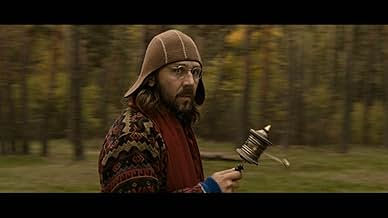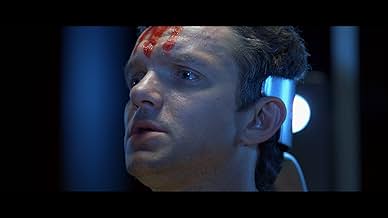Generation P
- 2011
- 1 घं 52 मि
IMDb रेटिंग
6.7/10
4.4 हज़ार
आपकी रेटिंग
अपनी भाषा में प्लॉट जोड़ेंA chronicle of the rise of the advertising industry in Post-Soviet Russia.A chronicle of the rise of the advertising industry in Post-Soviet Russia.A chronicle of the rise of the advertising industry in Post-Soviet Russia.
- पुरस्कार
- 2 जीत और कुल 5 नामांकन
Andrey Vasilev
- Savin
- (as Andrei V. Vasilyev)
कहानी
क्या आपको पता है
- ट्रिवियाKonstantin Khabenskiy turned down the role of Babylen Tatarsky. Than it went with Vladimir Epifantsev.
- गूफ़In the opening scene depicting the late 1980s USSR a street musician is holding a cordless microphone - an incredibly expensive piece of equipment at that time. Even popular Soviet musicians, gathering stadium sized audiences complained they couldn't afford them.
- कनेक्शनReferenced in kuji: Lado Kvataniya: The Idea of a Cinema (2024)
फीचर्ड रिव्यू
I would like to start from the fact that it is one of the rare examples from my experience, when the film version of the book was perceived inseparably from the original, not as an individual work, but as a continuation of the book. It could be either because of the respectful approach of the director Victor Ginzburg towards Pelevin's masterpiece, or because of the comprehensive nature of the book. The fact is that it is nearly impossible to review this movie without considering the original book, that is why this film review will include some observations from the novel as well.
I watched this film after reading the novel and there was no conflict of expectations and reality, to my astonishment. The only thing in the movie that did not match the picture, which came to my mind when I read the novel, is the appearance of the main character (I imagined him as Konstantin Khabensky). In other respects, this film perfectly represented my perception of the novel's events. In accordance with various interviews with the director Victor Ginzburg, this movie was shot independently from big film companies over several years and the financing of the movie was
found by the director himself. It was released in 2011, starring some of the big names of Russian film industry, and received mixed reviews from critics. Despite my perception of the novel and film, the plot of the movie has some major differences from the novel in terms of the plot and the message. However my review will be focused on the subject of the altered state of consciousness of the main character and how it affects his and the audience perception of reality. In my opinion, the director and, especially, the director of cinematography and editor did the great job
in delivering this atmosphere of the novel to the screen.
It can be assumed that the perspective of Vavilen Tatarsky, the main character of the film played by Vladimir Epifantsev, plays a huge role in this movie. What I mean by his "his perspective" is the situations and events of the book and described moments in Russia's history in "his eyes", how Vavilen sees and perceives it. It affects the mood, plot development and subject matter of the film. For example, the audience can view the beginning of the 1990s as
something interesting and curious, despite some hardships (audience and readers can feel it from the way he describes the market, where he worked as a cashier, where the whole difference of people occurs). Readers/audience's perspective is affected by Vavilen's state of mind, and Vavilen's mind, in its turn, is affected, first of all, by historical events of 1990s' Russia, and,
secondly, the type of drugs Vavilen takes throughout the movie. It also could be paraphrased, that Vavilen's perception of the historical reality of 1990s Russia is affected by his active drug use. For the first example, the audience can see that the majority of the film/book Vavilen actively uses cocaine, which stimulates the brain, mental effects of which may include an "intense feeling of happiness, loss of contact with reality, or agitation". It can be assumed that his glamorous perception
of the advertising business and his "flashy", sometimes controversial advertisement lines can be influenced by his constant cocaine usage. The editing of the movie from the beginning to the middle of the movie can be described as fast, the scenes replace each other and the years of Vavilen's life and Russia's history are delivered in the matter of minutes of the film. However, some scenes, which take longer than usual, deliver just couple of days of Vavilen's, and in those scenes Vavilen either sober, or taking psychedelic drugs, such as LSD or mushrooms, which are given to him by the weird characters such as his old classmate, played by Shnurov or some stranger in the bar. By its nature, psychedelics do not cause happiness, but allow us to view
things from different points of view and see hallucinations. All the "weirdest" scenes, where he sees Babel or interacts with Che Guevara, are the ones where Vavilen takes psychedelics.
Director perfectly delivers this atmosphere with the help of special computer effects. However, in my opinion, it is not drugs that cause these scenes, but Pelevin's mind, and the reason why he added all these drugs may be to make these crazy things be justified by the audience like me and perceive his thoughts as normal.
It can be concluded that here perspective does matter to view the character and his
personality, but it does not affect the message of the book.
- agzam-86461
- 20 सित॰ 2020
- परमालिंक
टॉप पसंद
रेटिंग देने के लिए साइन-इन करें और वैयक्तिकृत सुझावों के लिए वॉचलिस्ट करें
- How long is Generation P?Alexa द्वारा संचालित
विवरण
बॉक्स ऑफ़िस
- बजट
- $70,00,000(अनुमानित)
- दुनिया भर में सकल
- $46,64,538
- चलने की अवधि1 घंटा 52 मिनट
- रंग
- ध्वनि मिश्रण
- पक्ष अनुपात
- 2.35 : 1
इस पेज में योगदान दें
किसी बदलाव का सुझाव दें या अनुपलब्ध कॉन्टेंट जोड़ें































